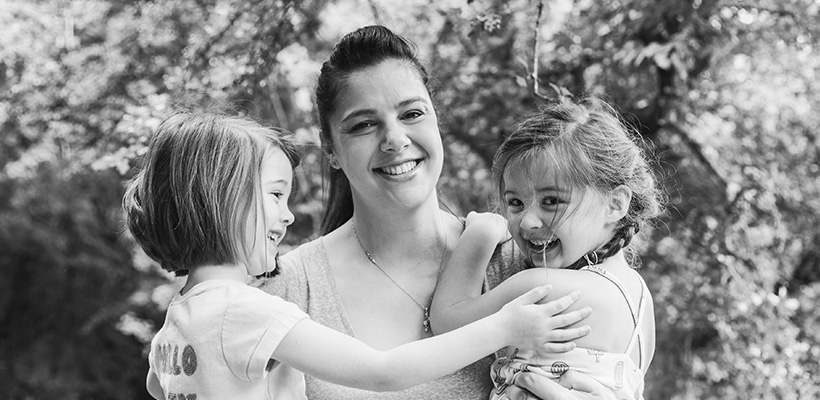
My superpower is to make a room full of people cry."
As she says this, Vali Creus laughs like she’s very pleased with herself. When she speaks as an OCRF ambassador she wants people to be moved, so they remember her two key messages about early detection and fertility.

I feel so fortunate that I’m still here and able to raise awareness and to tell my story and hopefully change other people’s lives.”
The 41-year old ovarian cancer survivor is an example of medical ingenuity which enabled her to become pregnant even though both her ovaries had been removed.
When Vali was 19, cancer caused her to lose one ovary. Immediately she feared she might never be able to conceive. At the age of 24, when more tumours were discovered, her second ovary had to be taken but doctors preserved it and, years later, implanted ovarian tissue into her body in a world-first operation which resulted in Vali becoming the mother of twin girls, Alexis and Kaia, now five years old.
"There had been operations on people previously where they implanted the tissue into the correct anatomical spot. I had a lot of damage from surgery and cleaning all the tumours up so they didn’t think that would work, so the world-first part was they implanted the tissue on my abdominal wall and it still produced the hormones and eggs."
It enabled her to “live the life I imagined”, a hope she wishes to pass on.
“By sharing my story I hope that other women going through cancer would consider fertility preservation. It isn’t a big focus because (doctors) are trying to save your life. It was important for me to be well, but you also want to have something to look forward to.”
Vali is equally passionate about early detection being about women pursuing their medical concerns. From the age of 16, she had sought medical help for debilitating periods.
“Doctors would just tell me girls have painful periods and dismiss me. For years I was trying to get to the bottom of why I was so sick. I was exhausted and could barely get through the day. I just kept going back even though I’m sure the doctors looked at me like I was insane. It got worse and worse. Eventually they decided I had endometriosis so I had surgery, which is when they found the tumour."

It’s about not taking no for an answer if you feel there’s something not right. How quickly you are diagnosed makes a difference to your chance of survival.”
Vali’s first cancer was a slow-growing tumour but when she was diagnosed in her twenties there were more than 15 tumours in her body, which required intense chemotherapy. When she recovered, her wish to become a nurse, for which she had put in more than two year of study, was over.
“I couldn’t do it. I just didn’t think I could spend the rest of my life in a hospital so I gave that up.” Setbacks came from unexpected places too. She had hoped to return easily to her love of playing basketball. “When I went back the coach didn’t want me because I’d been sick. I was really disappointed. I was really angry.”
Currently working as a a hospital payroll manager, Vali has her sights on soon completing a Master’s degree in human resource management. Cancer, she says, won’t define her.
“It makes me frustrated when people focus on it. I’ve had setbacks. Your life gets derailed. Maybe I lost my way a little bit, but it hasn’t stopped me.”
And while she jokes about her superpower, she is well aware that she is only human after all.
‘Every time I speak I get emotional and well up. It’s such as big thing to happen to you. It never really leaves you, that feeling of finding out you’re sick.”
